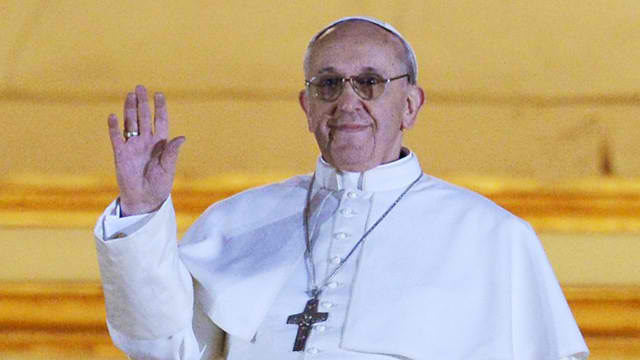SUMMARY
This is AI generated summarization, which may have errors. For context, always refer to the full article.

VATICAN CITY, Vatican – Pope Francis is launching a sweeping study of the scandal-plagued Vatican bank before a possible clear-out of top management at the Holy See, the Vatican revealed on Wednesday.
In his first real step towards reform, the pontiff is to take a hands-on approach, ensuring that everything a special five-member commission uncovers will be reported directly to him.
The 76-year-old is particularly keen to “better know the judicial position and activities” of the Institute for Works of Religion (IOR), as it is known, which has struggled to shake off its murky image amid persistent reports of shady dealings.
The Vatican said the commission would have top-level access allowing it to get its hands on all documentation.
“Pope Francis’s revolution starts with the IOR,” said Carlo Marroni, Vatican watcher for Il Sole 24 Ore daily, describing it as “a decisive, strong and completely unusual intervention.”
Religious expert Andrea Tornielli agreed, saying it was “an innovative decision.”
“Before he carries out reforms, Francis wants to know everything, and I mean everything that happens within the shadow of the Nicolo V bastion,” the bank’s headquarters, he wrote in La Stampa daily’s Vatican Insider.
Troubled history
The bank has a troubled history, which includes the collapse of the Banco Ambrosiano, in which the Holy See was the main shareholder, and which had been accused of laundering money for the Sicilian mafia.
The chairman of Banco Ambrosiano, Roberto Calvi — dubbed “God’s Banker” in the press — was found hanging from Blackfriars Bridge in London in 1982 in a suspected murder by mobsters.
In 2011, Pope Benedict XVI created a new financial authority to reform the bank, with the aim of getting the Vatican on a “white list” of countries that cooperate with efforts against money laundering drawn up by the Organisation of Economic Cooperation and Development (OECD).
But critics complained that his approach was toothless and many are watching to see whether Francis will overhaul the highest rungs of the institution.
The zeal with which Francis has taken to attacking financial institutions globally since being elected pontiff in March has raised new questions about the future of the IOR and to what extent it will be affected by general wide-sweeping reforms to the Holy See.
The pope, elected amid an in-house debate over whether it is necessary to have a Vatican bank at all, has railed against the cult of money, calling for a “poor Church”.
He has also quipped that “St. Peter did not have a bank account”, and warned the IOR and other Vatican staff that “offices are necessary but they are necessary only up to a certain point.”
Earlier this month, Francis named cleric Battista Mario Salvatore Ricca to oversee the IOR’s management — effectively placing a trusted ally in a key position to report to him.
The new committee, headed up by Cardinal Raffaele Farina — former archivist of the Vatican’s Secret Archives, will be made up of four prelates and Harvard law professor Mary Ann Glendon.
Major overhaul
The Vatican promised in 2011 to redouble its efforts to reform the bank and overhaul its financial legislation following reports of anonymous accounts at the bank being used by organised crime.
The move was sparked by an investigation launched after the financial intelligence office at the Bank of Italy noticed two operations by the bank that it deemed suspicious.
An Italian court seized 23 million euros ($29 million) from the bank, releasing it in 2011.
The bank was back in the headlines in 2012, when its head Ettore Gotti Tedeschi was sacked by the board after a major falling out with the Holy See’s Secretary of State Tarcisio Bertone.
In February this year, the Vatican named German financier Ernst von Freyberg as the bank’s new head, and he is currently overseeing a review of its 19,000 or so accounts, and investigating reports of suspicious activity indicating possible money laundering or fraud.
The IOR, which does not lend money, manages assets of 7.0 billion euros ($9.3 billion) and handles funds for Vatican departments, Catholic charities and congregations as well as priests and nuns living and working around the world. – Rappler.com
Add a comment
How does this make you feel?
There are no comments yet. Add your comment to start the conversation.